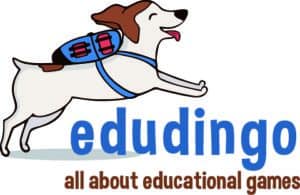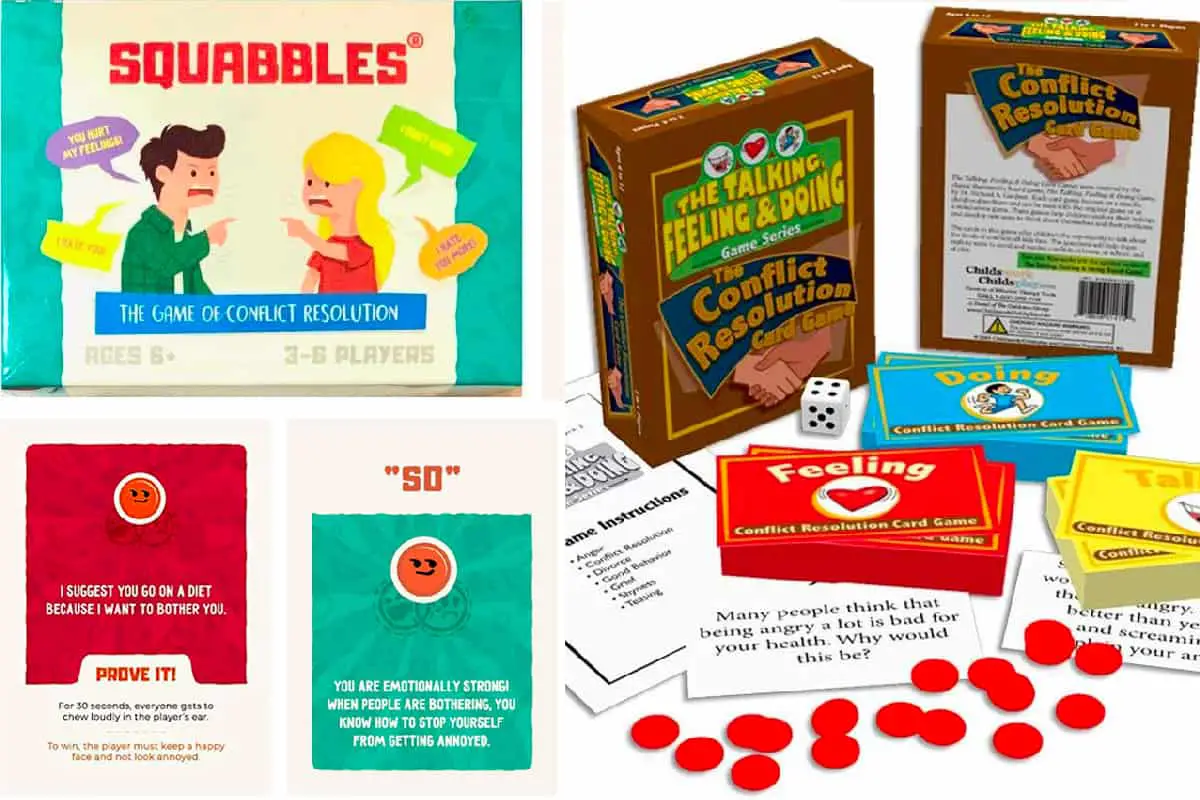This post contains affiliate links.
Conflict resolution abilities are so important, and card games are great for teaching them as they are affordable, easy to set up and foster communication between players. So I looked for the available alternatives.
I found 4 useful conflict resolution card and dice games – for children from 6 to 17-year-old at home or school. I particularly recommend “Squabbles” as a great approach for parents whose children experience aggression and “The Conflict Resolution Card Game” as a more generic approach to conflict management.
Conflict Resolution Card Games Comparison Table
| Game | Age | Players | For Home | For School | For Counseling | Rating |
| The conflict resolution card game | 6‑12 | 2-4 | X | X | X | ★★★☆☆ |
| Squabbles | 6‑17 | 3-6 | X | X | X | ★★★★★ |
| Choices | 10‑17 | 2‑36 | X | ★★★★☆ | ||
| Give everyone a fair shake | 8‑12 | 2-4 | X | X | ★★★☆☆ |
Remark: games recommended for counselors/therapists with children who are open to cooperating, are less fun than popular games, except Squabbles with its roleplay which is really great in all respects
Three Conflict Resolution Card Games
The Conflict Resolution Card Game (Childswork / Childsplay) – Talking, Feeling, & Doing Game Series
★★★☆☆
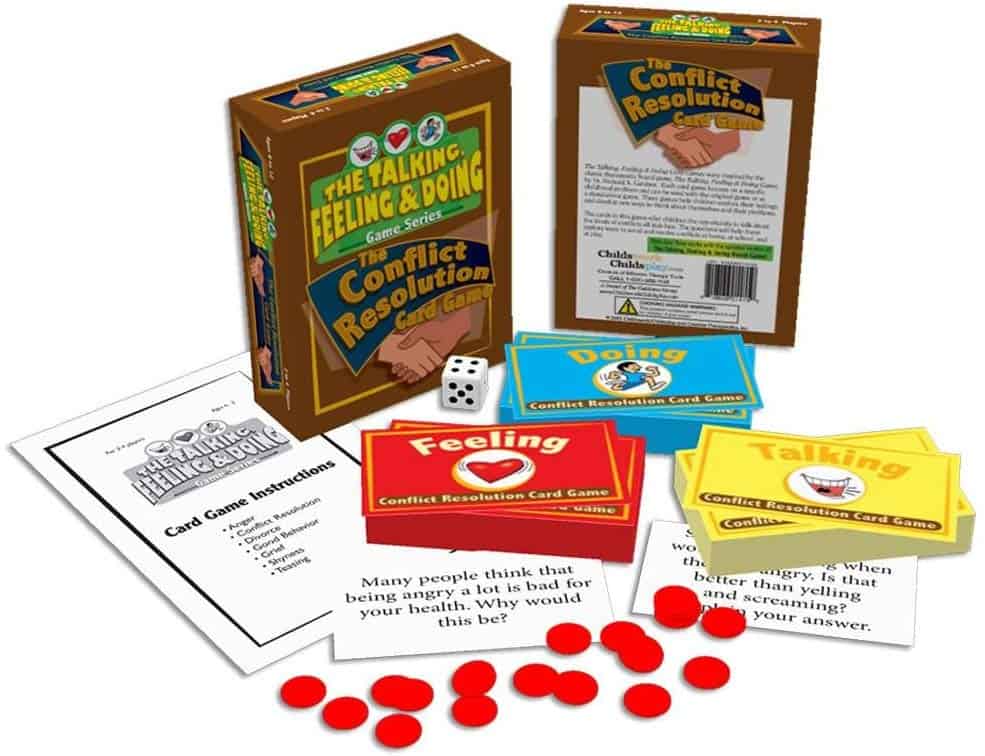
Ages: 6-12
Players: 2-4
Price: €€€
The Conflict Resolution Card Game is designed to help counselors, teachers, or parents focus on specific areas that are a concern to children. It contains 99 cards that help children communicate their feelings and develop insight into their problems.
is designed to help counselors, teachers, or parents focus on specific areas that are a concern to children. It contains 99 cards that help children communicate their feelings and develop insight into their problems.
This is intended to help children reveal their concerns and conflicts to an adult who can provide both nurturance and guidance. As such, it can be used as a diagnostic tool as well.
I definitely recommend “The Conflict Resolution Card Game”.
A downside though is that it is not especially fun (the mechanism is a bit too near to an exercise than a game). So at home, it will be easier to play it if your children are nice enough to accept to cooperate with you even if they do not find it really fun. Also, if you want a more structured and comprehensive approach, you can have a look at Board Games for Conflict Resolution.
Squabbles – The Game Of Conflict Resolution (Brooks Gibbs)
★★★★★
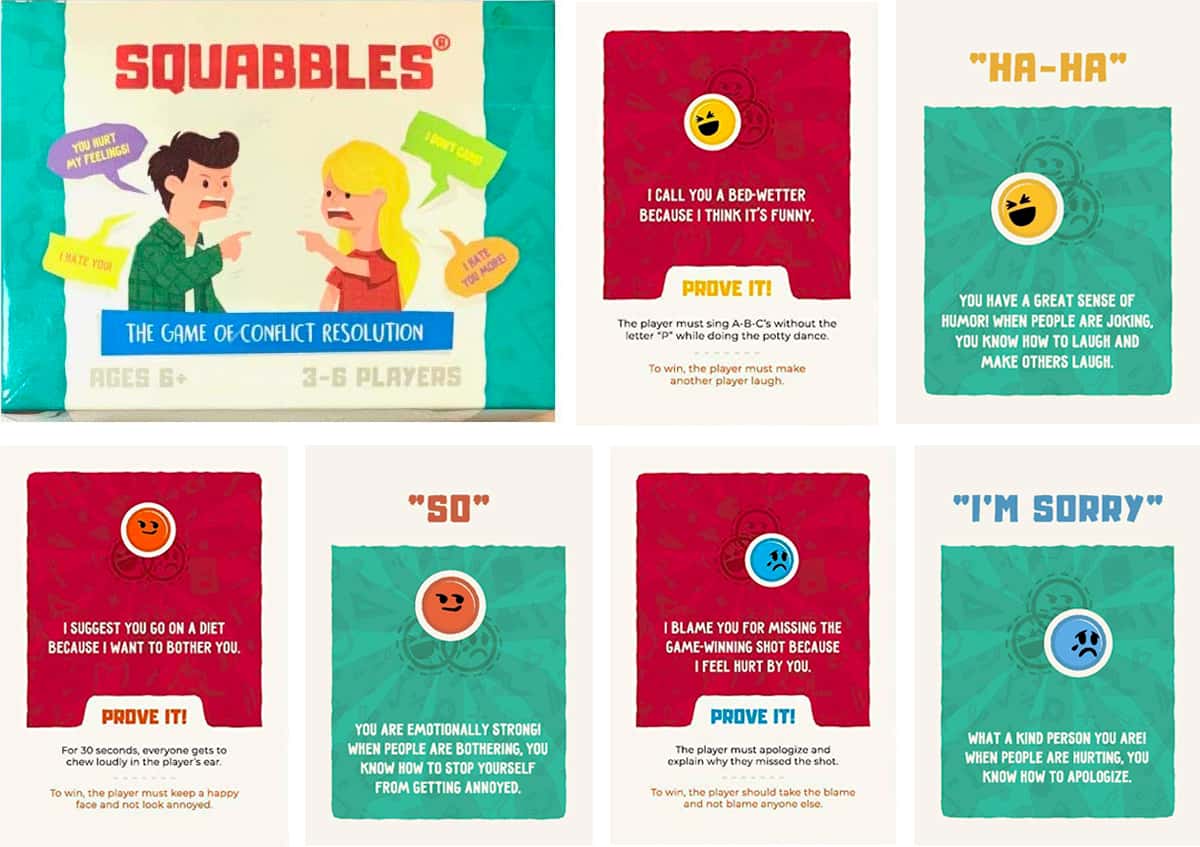
Ages: 6+
Players: 3-6
Squabbles is a role-playing game that teaches students how to resolve conflicts based on someone trying to “bully” another person (psychologically, not physically).
is a role-playing game that teaches students how to resolve conflicts based on someone trying to “bully” another person (psychologically, not physically).
In the game, players learn three types of aggression and corresponding solutions that they can practice immediately. These solutions aim among other things at making kids resilient in the event of aggression and preventing conflicts from degenerating actions.
It is especially effective for students who are sensitive to the mean words and actions of others. The game introduces students to three reasons and ways people are intentionally mean:
- Trying to control us
- Joking to have fun at our expense
- Hurting us because they feel hurt by us
The game contains conflict cards and resolution cards. Once you identify why someone is being mean, resolution cards show you how to stop the mean behavior and quickly resolve the conflict.
Students can win points by:
- Matching a conflict card with a resolution card
- Completing a challenge
- or trying not to lose Squabbles
The game can be played either for a short period of time (in the classroom for example) or for a long one (as a family game for example).
I highly recommend Squabbles as an activity to become resilient to bullying attempts, both at home and school. And it has the added benefit as a game to be really fun when squabbling.
You will fully understand the process used by this game by watching these two videos (the first one is very short, and the second one is 44 minutes long but is very interesting as it includes coaching as well as a demonstration of the principles) by Brooks Gibbs:
Choices – A Cooperative Conflict Resolution Game (Kagan)
★★★★☆
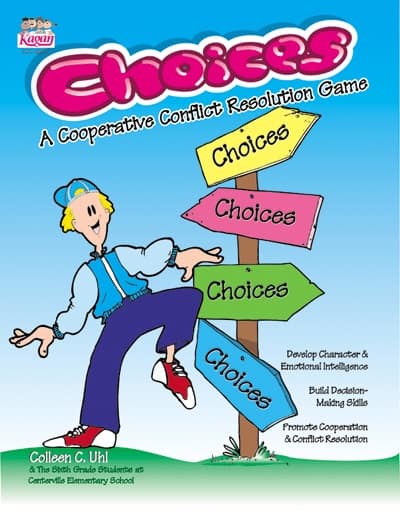
Age: 10 to 17
Players: up to 9 teams
Author: Colleen Uhl
Kagan is well known for its cooperative learning approach and materials. This game takes a cooperative approach to learn conflict resolution.
In ” Choices“, each team receives a set of team conflict scenarios and choice cards they use to discuss solutions to the conflict.
They also receive personal conflict scenarios to work on the conflicts they face in real life. And they can create their own conflict scenarios, and come up with their own choices to solve the conflicts.
There are enough scenarios and cards for nine teams. I recommend this game for schools, as it works and is very cost-effective for teachers (one inexpensive game for nine teams – and you can have your entire classroom play with one game!).
Dice Games
Give Everyone A Fair Shake – Conflict Resolution Game (Franklin Learning Systems) – Toss and Learn Series
★★★☆☆
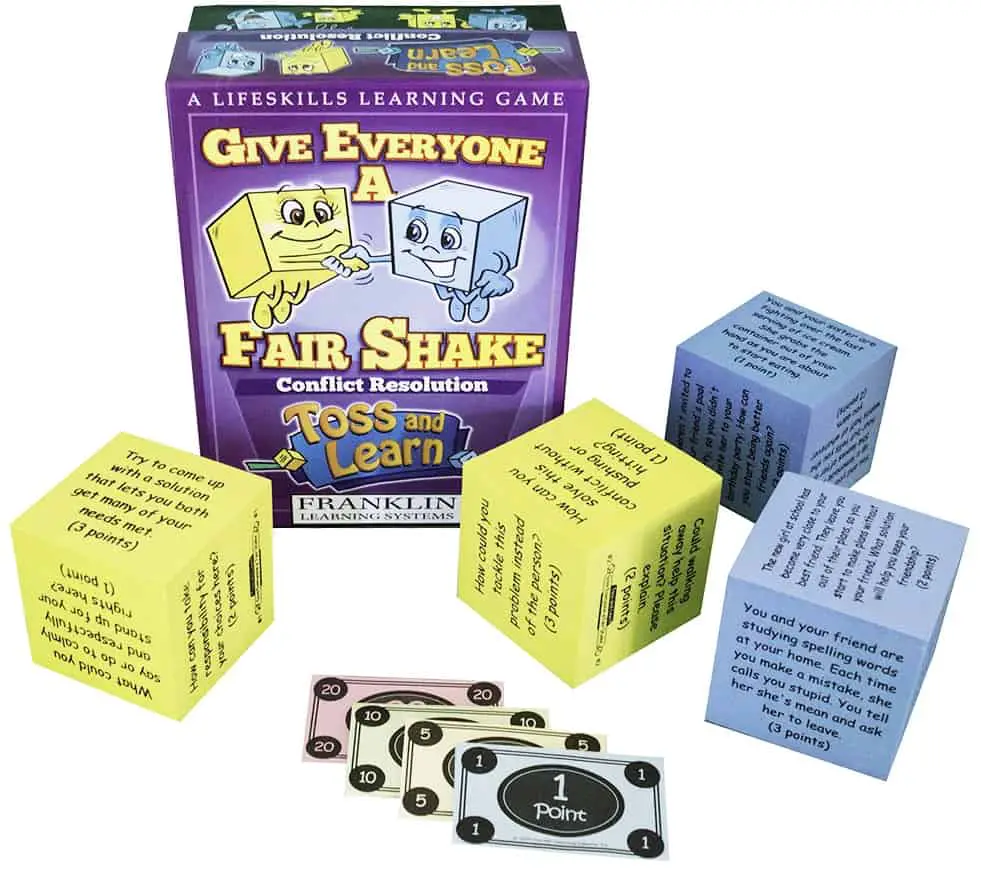
Age: 8-12 (Grades 3-6)
2 to 4 players
Price: $$
This “Give Everyone A Fair Shake – Conflict Resolution” dice game is suitable for situations where there is an adult (counselor, parent) playing as a facilitator of the game with the children. He/she helps them validate the answers given by the players and be more creative. So it is really usable at home for example, but not in situations when students need to be able to play in autonomous groups (like in the classroom).
The game has 2 blue dice with situations (12 situations) and 2 yellow dice for questions or actions (12 types of questions/actions). The player tosses both and has to give relevant answers to the situation.
On the positive side:
- The principle is very simple
- Even if you win points by giving answers, you need not make it a competitive game
- The skills learned are varied:
- Listening
- Respect
- Searching a win-win
- Taking responsibility
- Knowing when to walk away
- Not blaming others
- Tackling the problem, not the person
- Children like tossing these dice
- Comes with facilitator guidelines
But on the other hand:
- There are only 12 situations / 12 questions/actions which is a limitation. With a card game, it would have been easy to have at least twice as many possibilities bor both.
- The fact that you cannot sort (like you could with cards) means that you cannot make levels of progression, or easily adapt the game to a specific objective
So the game suffers from this lack of flexibility. It is usable by parents, but much less so by teachers who need to create progression, or by therapists who need to tailor the game to a specific objective.
For those searching for a cheaper alternative, I definitely recommend trying this game.
Other Types of Conflict Resolution Games
Board Games
Board games are more comprehensive and are a great way of engaging a small group of children. If you are interested in board games for teaching conflict resolution, please read the following post: 7 Conflict Resolution Board Games For 7 to 17 Year-Olds.
Indoor/Outdoor Activities
Game-like activities that make you move your body is another great approach to get students involved and engaged. There are many out there. The following book describes 26 such activities for schools. I really recommend it.
WinWin Games! (PeaceWorks)
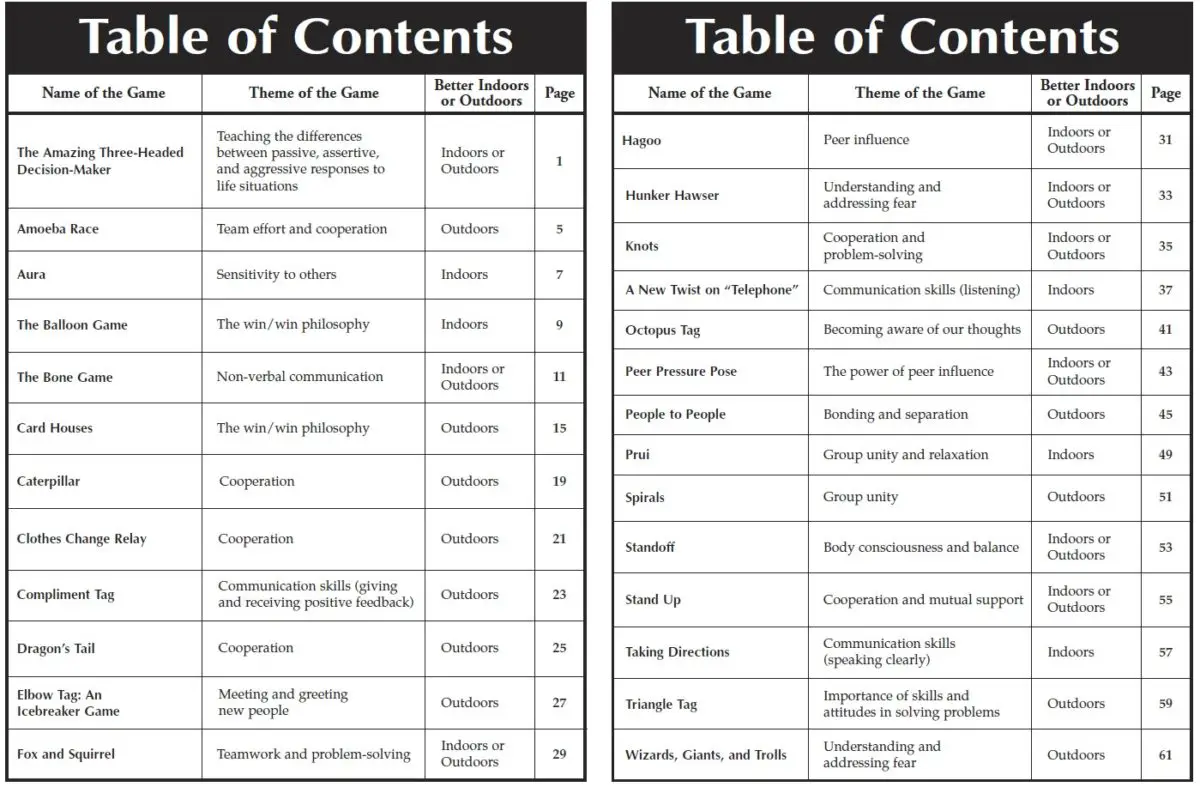
Age: 9 to 17
Players: number of players depends on the game
The WinWin! Games book includes 25 games involving movement while learning teamwork, cooperation, building community, conflict resolution, problem-solving, effective communication.
book includes 25 games involving movement while learning teamwork, cooperation, building community, conflict resolution, problem-solving, effective communication.
Each game is explained in detail and includes explanations that foster meaningful discussion of the concepts behind the game.
Here are the table of contents and some sample games
and some sample games to better understand the approach.
to better understand the approach.
I really recommend this approach – it keeps students involved at moments where they could easily lose their focus.
Edudingo.com is a participant in the Amazon Services LLC Associates Program, an affiliate advertising program designed to provide a means for sites to earn advertising fees by advertising and linking to Amazon.com. We also participate in other affiliate programs which compensate us for referring traffic.
